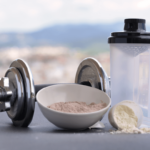Unlock the secrets to boosting your athletic performance and overall health with more than 98 bite-size nutrition tips.
Whether you’re an active person looking for that extra edge, or simply aiming to improve your diet, understanding the intricacies of protein, carbohydrate, and fat intake can make all the difference.
With practical advice on calculating your nutritional requirements, timing your intake for maximum benefit, and choosing the right foods for recovery and endurance, this article is your go-to resource for nutritional knowledge.
Oh, and if you’re wondering if the gelatin gummy worm is a real nutrition tip, go see the first miscellaneous tip 😉
Jump to:
A Quick Word From Me First
I’m currently 43 years old and over my 20+ years of training, I’ve tested and optimized my nutrition (a lot). Here’s what I learned along the way. hopefully, some of these will resonate with you and you’ll test them.
Protein Intake
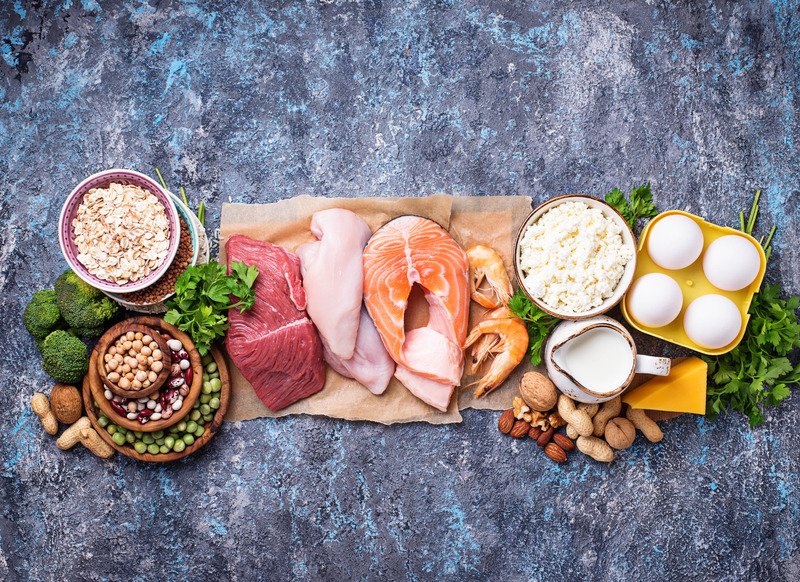
High-Quality Protein Sources: Incorporate high-quality proteins such as lean meats, fish, poultry, eggs, dairy, legumes, and soy products into your diet to support muscle repair and growth.
Protein Needs for Athletes: Athletes generally require more protein than sedentary individuals—about 1.2 to 2.0 grams of protein per kilogram of body weight daily to support muscle repair and growth.
Calculate Your Protein Needs: To calculate your daily protein needs, multiply your weight in kilograms by the recommended intake (1.2 to 2.0 g/kg for athletes). For example, a 70 kg athlete might need between 84 to 140 grams of protein per day.
Protein Powders as a Supplement: Consider protein powders (whey, casein, or plant-based) as a convenient supplement to help meet daily protein needs, especially post-workout.
Branch-Chain Amino Acids (BCAAs): Foods high in BCAAs (leucine, isoleucine, valine), like whey protein, can be particularly effective at stimulating muscle protein synthesis.
Protein Timing for Optimal Recovery: Consuming protein within 30 minutes to two hours after exercise can optimize muscle recovery and growth.
Avoid Excessive Protein: While protein is essential, excessive intake (over 2 g/kg of body weight per day) over long periods can stress the kidneys in some individuals and isn’t necessarily linked to increased muscle gain.
Diversify Protein Sources: Eating a variety of protein sources can ensure you’re getting a broad spectrum of amino acids and other nutrients.
Lean Proteins for Weight Management: Incorporating lean protein sources can help with satiety and weight management, making it easier to maintain or achieve a healthy body composition.
Understand Protein Quality: The quality of protein is measured by its amino acid composition and digestibility. Animal proteins are typically high quality, while plant proteins may need to be combined to achieve completeness.
Protein in Snacks: Including protein in snacks can help maintain nitrogen balance and support muscle maintenance throughout the day.
Seafood for Omega-3s: Fatty fish like salmon and mackerel are not only good protein sources but also provide omega-3 fatty acids, beneficial for heart health and inflammation reduction.
Legumes as Protein and Fiber Sources: Beans, lentils, and peas are great plant-based proteins that also offer fiber, helping with digestion and satiety.
Egg Whites for Pure Protein: Egg whites are a pure protein source, ideal for those looking to increase protein intake without additional fats.
Greek Yogurt for Casein and Whey: Greek yogurt is a great source of both casein and whey protein, offering slow and fast digesting protein options for sustained amino acid release.
Track Your Protein Intake: Using a food diary or app to track protein intake can help ensure you’re meeting your daily needs for optimal performance and recovery.
Milk as a Recovery Drink: Milk contains a blend of whey and casein protein, making it an effective post-workout recovery drink to promote muscle repair.
Soy Products for Quality Plant Protein: Soy products like tofu, tempeh, and edamame are high-quality plant proteins that can support muscle health in vegetarian and vegan athletes.
Protein Intake Spread Throughout the Day: Distributing protein intake evenly across meals can enhance muscle protein synthesis.
Plant vs. Animal Proteins: Understand that while animal proteins generally contain all essential amino acids, combining different plant proteins can also meet these needs for vegetarians and vegans.
Nutritional Yeast for Vegans: Nutritional yeast is a complete protein source, rich in B vitamins, making it an excellent choice for vegans and vegetarians.
Carbohydrates Intake
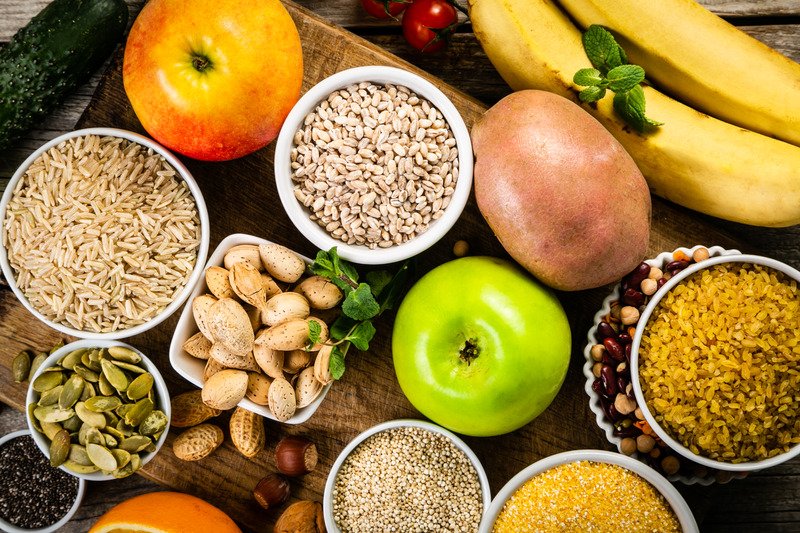
Complex Carbohydrates for Endurance: Consuming complex carbohydrates like whole grains provides a more sustained energy release, beneficial for endurance activities.
Stevia as a Natural Sweetener: Stevia can be a healthy sugar alternative for athletes looking to reduce added sugar intake without sacrificing sweetness. It has no calories and can help manage blood sugar levels.
Reducing Added Sugars: Limiting foods with added sugars can help control energy levels, reduce health risks, and improve body composition.
Timing of Carb Intake: For endurance athletes, consuming carbohydrates during long sessions can help maintain energy levels and improve performance.
Carbs for Recovery: Post-exercise, including carbohydrates helps replenish muscle glycogen, especially important after high-intensity or long-duration workouts.
Fructose in Moderation: While fruits are healthy, high intake of fructose can lead to digestive issues in some individuals; balance is key.
Sugar Alternatives for Baking: Using sugar alternatives like apple sauce, banana puree, or stevia in baking can reduce calorie intake while still providing sweetness.
Low-GI Snacks Pre-Workout: Snacks with a low glycemic index can provide a steady release of energy, preventing spikes and crashes in blood sugar levels during exercise.
Natural Sugars from Fruits: Natural sugars found in fruits come with fiber, vitamins, and minerals, making them a healthier choice than refined sugars.
Whole Food Carb Sources: Choosing whole food sources of carbohydrates like sweet potatoes, quinoa, and beans can provide essential nutrients and fiber for energy and health.
Stevia in Hydration: Adding stevia to water or homemade electrolyte drinks can improve flavor without adding calories, encouraging better hydration.
Carb Loading Strategy: Properly timing carb loading before endurance events can maximize glycogen stores for improved performance.
Understanding Sugar Alcohols: Sugar alcohols can offer sweetness with fewer calories but may cause digestive discomfort in some athletes; moderation is key.
Carbohydrate Periodization: Tailor your carbohydrate intake based on the intensity and duration of your training sessions to optimize energy use.
Limiting Refined Sugars: Reducing intake of refined sugars can help manage energy levels and body composition.
Glycemic Index Awareness: Choosing foods with a low to moderate glycemic index can help maintain steady energy levels.
Fat Intake
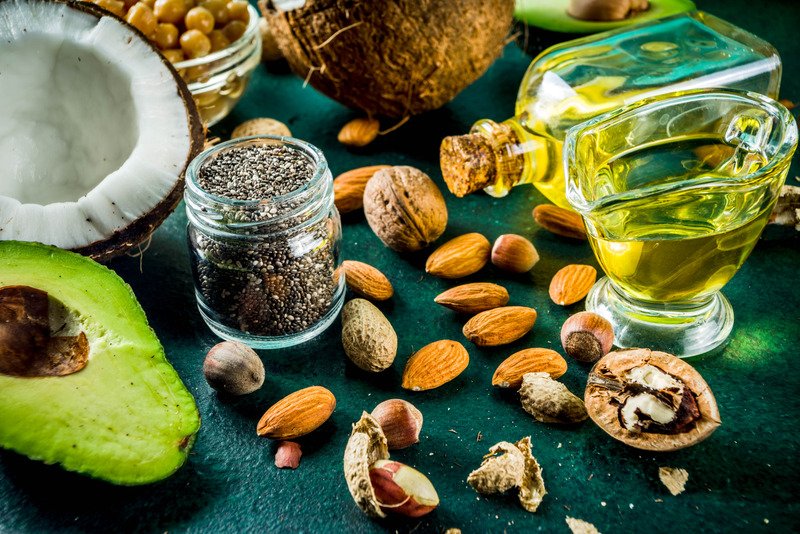
Monounsaturated Fats for Heart Health: Include sources of monounsaturated fats like avocados, nuts, and olive oil to support heart health and provide sustained energy.
Omega-3 Fatty Acids for Inflammation: Fatty fish, flaxseeds, and walnuts are rich in omega-3 fatty acids, which can help reduce inflammation and improve recovery times.
Limit Trans Fats: Trans fats found in processed foods can increase the risk of heart disease and should be minimized in an athlete’s diet.
Saturated Fat in Moderation: While saturated fats are not inherently bad, they should be consumed in moderation. Focus on whole food sources like dairy and meat.
Calculating Healthy Fat Portions: A healthy fat portion can be visually estimated as the size of your thumb for oils and fats, or a small handful for nuts and seeds.
Cooking with Healthy Fats: Use oils high in monounsaturated fats like olive oil for cooking at low to medium temperatures to maintain heart health.
Balancing Fat Intake: Aim for fats to make up about 20-35% of your total daily calories, with a focus on unsaturated fats for optimal health.
Reading Food Labels for Fats: Check food labels not just for total fat content but for the presence of trans fats and saturated fats. Opt for products with higher unsaturated fats.
Coconut Oil Sparingly: Coconut oil can be used, but sparingly, due to its high saturated fat content. It’s best used in moderation within a balanced diet.
Snacking on Healthy Fats: Snacks like almonds, chia seeds, or avocados can provide healthy fats and other nutrients beneficial for athletes.
Flaxseed and Chia Seeds for Vegans: Vegans or those who do not eat fish can get ALA (a type of omega-3 fatty acid) from flaxseeds, chia seeds, and hemp seeds.
Moderate Butter and Cream: Use butter and cream in moderation, opting for versions from grass-fed animals when possible for a higher content of beneficial nutrients.
Incorporating MCT Oil: Medium-chain triglyceride (MCT) oil can provide a quick energy source for athletes and can be added to smoothies or coffee.
Avoiding Deep-Fried Foods: Deep-fried foods often contain unhealthy fats and can contribute to inflammation, impacting recovery and health.
Choosing Lean Meats: Opt for lean cuts of meat to reduce saturated fat intake while still getting essential nutrients like protein, iron, and zinc.
Understanding Fat-Soluble Vitamins: Healthy fats aid in the absorption of fat-soluble vitamins (A, D, E, K), so include a fat source with meals rich in these vitamins.
Dark Chocolate in Moderation: Dark chocolate is a source of antioxidants and can be a healthy treat when consumed in moderation due to its fat content.
Olive Oil as a Dressing: Using olive oil as a dressing for salads or vegetables can enhance flavor and provide a healthy dose of monounsaturated fats.
Homemade Nut Butters: Making nut butters at home can ensure they’re free from added sugars and unhealthy fats, providing a healthy snack option.
Avocado as a Fat Source: Avocado is a versatile source of healthy fats, fiber, and vitamins. It can be added to smoothies, salads, or toast for a nutrient boost.
Healthy Portion Sizes for Oils: When using oils, a portion size of about one tablespoon (15ml) is generally a healthy amount for cooking or dressing.
Seed Oils with Caution: Some seed oils are high in omega-6 fatty acids, which can be pro-inflammatory in excess. Balance them with omega-3 sources.
Balanced Omega-6 to Omega-3 Ratio: Aim for a balanced ratio of omega-6 to omega-3 fatty acids by including more fish, walnuts, and flaxseeds in your diet.
Full-Fat Dairy for Satiety: Full-fat dairy products can increase satiety and provide essential nutrients, but they should be consumed in moderation due to their saturated fat content.
Supplementation
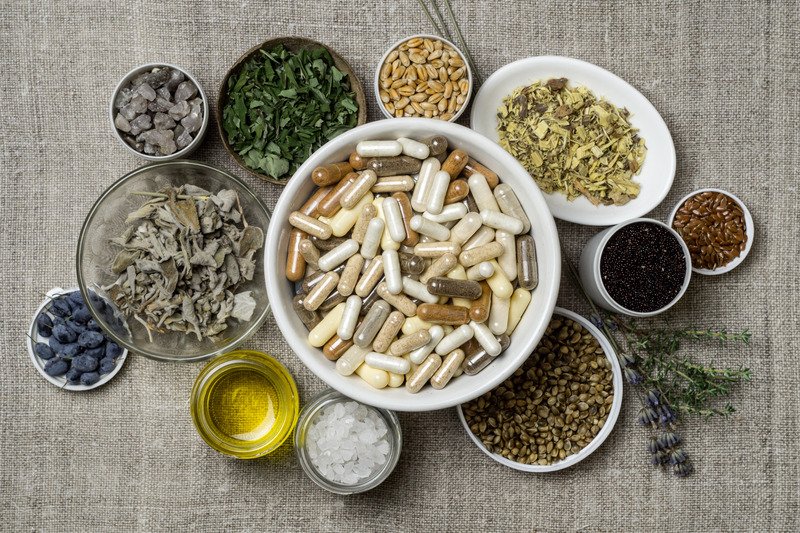
Omega-3 Fatty Acids for Recovery: Omega-3s found in fish oil can help decrease muscle soreness and improve recovery by reducing inflammation.
Vitamin D for Strength: Adequate Vitamin D levels are linked to improved muscle function and strength.
Beetroot Juice for Stamina: Drinking beetroot juice can increase plasma nitrate levels and boost physical performance by improving blood flow.
Tart Cherry Juice for Recovery: Tart cherry juice has been shown to reduce muscle pain and loss of strength after intense exercise due to its anti-inflammatory effects and antioxidants.
Protein Before Bed: Consuming a protein-rich snack before bed can promote muscle repair and growth overnight.
Ginger for Muscle Pain: Ginger supplementation can reduce muscle pain after strenuous exercise thanks to its anti-inflammatory properties.
Curcumin for Recovery: The active ingredient in turmeric, curcumin, can help reduce inflammation and muscle soreness post-exercise.
Zinc for Immune Function: Adequate zinc intake is crucial for maintaining a strong immune system, especially in athletes undergoing rigorous training.
Magnesium for Muscle Health: Magnesium is vital for muscle function and relaxation. It may also help prevent cramps and muscle soreness.
Iron for Energy: Especially in female athletes, maintaining adequate iron levels is crucial for energy production and overall performance.
Calcium for Bone Health: Adequate calcium intake is essential for bone health, especially in impact sports.
Branched-Chain Amino Acids (BCAAs): BCAAs can promote muscle protein synthesis and increase muscle growth over time.
Vitamin C for Recovery: Vitamin C is crucial for collagen synthesis, immune function, and may help reduce soreness.
Sodium for Electrolyte Balance: Adequate sodium intake is crucial for athletes, especially those who sweat heavily.
Caffeine for Endurance: Moderate caffeine intake before exercise can increase endurance levels and reduce perceived effort during physical activity.
Limiting Caffeine to Morning Hours: To avoid affecting sleep quality, limit caffeine intake to the morning or early afternoon.
Hydration

Hydrate with Electrolytes: Beyond water, replenishing electrolytes is crucial for preventing cramps and maintaining electrolyte balance, especially for endurance athletes.
Hydration with Coconut Water: Coconut water is a natural source of electrolytes, making it an excellent hydration choice post-workout.
Hydration Before Exercise: Starting exercise in a hydrated state can prevent early fatigue and performance decline.
Staying Hydrated: Even mild dehydration can impair performance and cognitive function.
Hydration Tracking: Keeping track of your hydration status can prevent dehydration and overhydration, both of which can impair performance.
Miscellaneous
Health Benefits of Gelatin Gummies: Gelatin from grass-fed beef and vitamin C can make beneficial gummy snacks, improving digestion, joint health, and skin, as recommended by Cindy Shiff of GreenPaxx.
Balancing Macronutrients: Tailoring your ratio of proteins, fats, and carbohydrates based on your sport and energy needs can optimize performance.
Mindful Eating: Listening to your body’s hunger and fullness cues can help manage energy intake and body composition effectively.
Small, Frequent Meals: Eating small, frequent meals throughout the day can help maintain energy levels and metabolism, supporting overall performance.
Understanding Your Body’s Signals: Paying attention to signs of fatigue, hunger, and thirst can guide nutritional choices and prevent overtraining.
Pre-Workout Snacks: Eating a balanced snack before workouts can provide the necessary fuel for optimal performance.
Natural Pre-Workout Alternatives: Foods like bananas, oatmeal, or a small coffee can serve as natural pre-workout energy boosters.
Post-Workout Protein and Carbs: Consuming carbohydrates and protein post-workout can enhance recovery by replenishing glycogen stores and promoting muscle repair.
Antioxidant-Rich Foods: Consuming foods high in antioxidants can help reduce oxidative stress caused by intense training.
Fiber-Rich Foods: Including fiber-rich foods in your diet can help maintain a healthy digestive system and weight management.
Green Tea for Fat Oxidation: Green tea can enhance fat oxidation, which may help with weight management and endurance performance.
Adaptogens for Stress and Recovery: Herbs like ashwagandha and Rhodiola can help the body manage stress and improve recovery times.
Timing of Nutrient Intake: Aligning nutrient intake with your training schedule can optimize performance and recovery.
Limiting Alcohol: Alcohol can interfere with recovery processes and hydration status.
Seasonal and Local Foods: Consuming seasonal and local foods can provide fresher, nutrient-rich options.
Probiotics for Gut Health: Maintaining a healthy gut microbiome can improve nutrient absorption and immune function.
Continuous Learning and Adaptation: Nutritional science evolves, so staying informed and adapting your nutrition strategy is key to optimizing performance.
So there you have it. I hope you implement just a few of these in your daily routine, I guarantee it will make a big difference overtime!








